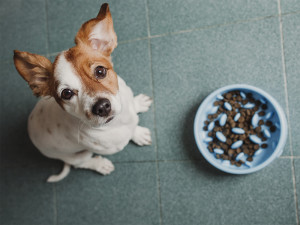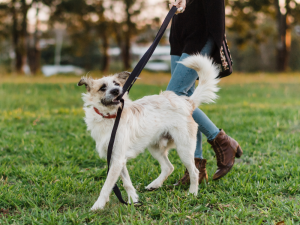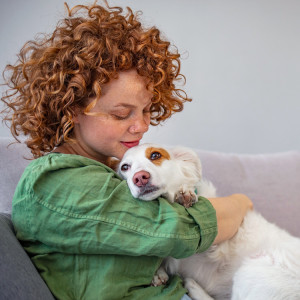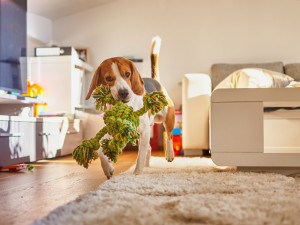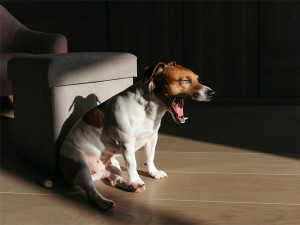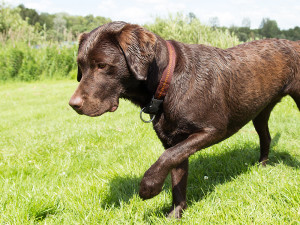Can Dogs Eat Ritz Crackers?
They’re great for the cheese plate, and your pup wants to try some.
Ritz crackers are one of those versatile comfort foods that may bring you straight back to childhood or might star in a new experimental dish like a modern casserole, acting as a substitute for basic breadcrumbs. Whatever their purpose, they have that buttery, crunchy taste that your pup may also find hard to resist.
The good news is that, yes, dogs can eat Ritz crackers in small amounts. However, they are not considered healthy for dogs and should not be in their regular treat rotation. Read on to learn more about Ritz crackers and dogs.
Nutrition facts about Ritz crackers for dogs
Ritz crackers fall into the category of ultra processed foods, meaning they do not contain whole food ingredients but rather have a long ingredient list that includes unbleached enriched flour, soybean and/or canola oil, palm oil, sugar, high fructose corn syrup, salt, leavening agents, and soy lecithin.
Of course, there are also “natural flavors” to balance out the list, whatever that means. These crackers tend to be moderately high in fat and salt, and also have added sugars. While some of these nutrients are necessary for dogs, too much of any one of them is not healthy for dogs.
How much do you spend on your pet per year?
Are Ritz crackers good for dogs?
Ritz crackers are not good for dogs. They lack the whole food ingredients that are healthiest for dogs and tend to be very low in vitamins, minerals, and other vital nutrients. They also contain a lot of ingredients that are not so healthy for dogs including:
Sugar: These crackers have added sugar and high-fructose corn syrup, which add simple sugars and excess calories to the final product. Dogs should not consume large amounts of sugar as those excess calories can lead to weight gain and conditions like diabetes or arthritis.
Fat: While fat is a healthy nutrient for dogs in the right proportions, high-fat snacks can add too many calories to the diet, putting them at risk for weight gain. And for dogs who are not used to eating high fat foods, a sudden high-fat snack can also cause digestive upset or pancreatitis.
Salt: Sodium is a mineral that is required for many critical functions in the body. However, excessive sodium is not healthy for dogs and can have unwanted side effects. This includes increased thirst, increased urination, increased blood pressure, and strain on the heart. It can also interfere with certain medications. In extreme cases, known as salt toxicity or hypernatremia, ingesting a large amount of sodium can lead to swelling of the brain and other life-threatening complications.
Simple carbohydrates: Carbohydrates can be a good source of energy for dogs, but it’s best to provide whole grain sources of carbohydrates that are also rich in fiber, vitamins, and minerals. Simple carbohydrates are quickly broken down into sugar in the body and can contribute excess calories, leading to weight gain.
Can dogs eat any crackers?
No. Many crackers contain added ingredients that are not safe, and may even be toxic to dogs. It’s always important to review the ingredients on any food before sharing it with your pup. Many foods that are perfectly safe for us can make our dogs sick.
This includes high- fat ingredients, lots of salt, or seasonings like garlic or onion powder, which are toxic to dogs if they consume enough. Even crackers that are free from toxic ingredients may be unhealthy for your pup and are not likely to contain a lot of whole food ingredients.
Are Ritz crackers completely safe for dogs?
Ritz crackers are not completely safe for dogs. While they are not toxic to dogs, they contain a number of unhealthy ingredients that are best to avoid when sharing snacks with your pup. This includes a high salt content, added sugars, fat, and simple carbohydrates.
The shape and texture of these crackers can also make them a choking hazard for dogs, especially if they try to gobble them up whole without chewing. If your dog gets the occasional small bite of a cracker, they’d most likely be fine, but if they got into a whole box and ate a large amount of Ritz crackers, it is important to contact your vet and watch for adverse reactions.
The bottom line: Can dogs eat human food?
There are many great options to choose from if you want to share a snack with your dog. And just like for us humans, there is a wide spectrum of what is healthy for dogs and what is not healthy. First and foremost, it is crucial to know which foods are truly toxic, so you can avoid those completely and keep your dog safe. When it comes to the foods that are healthiest to share, they are usually going to be plain, fresh, whole foods like safe fruits, veggies, or lean meats without seasonings, oils, or added ingredients.
Of course, there are also those intermediate foods that may not be as healthy but are ok every now and then. Those can be used for the occasional treat too, as long as you make sure not to overdo it. Dogs have unique nutritional requirements and need to get at least 90 percent of their daily intake from a complete and balanced dog food. That means treats and table foods should be less than 10 percent of their calories.
By sticking with this formula, you can ensure that your dog gets all of the nutrients they need and not too many of the ones they don’t need. It also helps balance out their overall intake to avoid accidentally overfeeding them and putting them at risk for weight gain and diet-related health problems. If in doubt, be sure to speak with your vet regarding healthy treat options and the best foods for your pup.
Other foods that are safe for dogs
Butternut squash can be a healthy choice.
Apples are another good option.
Peanut butter can also be a good option with a few caveats.
Other foods that are dangerous
Chocolate contains compounds that are toxic to dogs and should never be shared.
Grapes are also toxic and should be kept of out reach.
Rib bones are also a definite no-go.
FAQs (People also ask):
How many Ritz crackers can a dog eat?
Ritz crackers are not healthy for dogs and should be limited to the occasional small bite, or not at all if they have certain health conditions.
Is it OK to give dog Ritz crackers?
These are not healthy for dogs and could make some dogs sick so it is best to avoid them.
Why do dogs like Ritz crackers?
Dogs may like the crunchy texture and flavors on the cracker.
Are Ritz crackers safe for dogs?
They are not toxic to dogs but contain ingredients that could make dogs sick, especially if they eat a large amount.
References:
ASPCA Poison Control: People Foods Pets Should Never Eatopens in new tab
Merck Veterinary Manual: Pancreatitis in Dogs and Catsopens in new tab
UC Davis Veterinary Medicine: Treat Guidelines for Dogsopens in new tab







